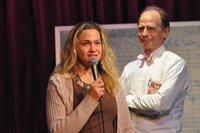Sally Taylor Gives a Lesson on Fame
 |
|
| In a visit to her uncle Livingston Taylor's performance class at Berklee, Sally Taylor spoke about growing up as the child of famous musicians James Taylor and Carly Simon. | |
| Phil Farnsworth |
Imagine growing up famous. Your parents are world-renowned performers. John Lennon is your next-door neighbor, and you walk to school with Paul Simon's daughter. Most aspiring musicians would think that sounded pretty sweet. Sure, you worry about your parents after Lennon's death, but what's a little anxiety when record labels compete to put out your debut record?
If only. During a February visit to a Berklee performance class taught by her uncle Livingston Taylor, it didn't take long for Sally Taylor-the daughter of Carly Simon and James Taylor-to get real with the Berklee students.
"There's sort of this mythology that fame makes you happy," she said. "But that's not true. You're not immediately afforded the luxury of never suffering again."
As she listed the perks of fame-with help from her uncle Livingston-she also revealed the dark linings of the silver clouds.
Money? Bills. Influence? You're constantly signing autographs. Importance? Way to become a massive jerk. Groupies? "It's a lot more fun in fantasy than it is in reality," Livingston said, grimacing.
Sally recalled the difficulties she encountered after she first decided to become a musician. It's not easy when your elders have accomplished so much, so Sally sought to stay out of the spotlight in the early stages. "I didn't want to suck in public," she said.
She turned down offers from major labels and hit the road with her Colorado-based band, playing 200 shows a year. "I wanted to see if I could do it on my own," she said. She could-and loved it.
And while her strategy protected her from embarrassment and headlines, it didn't guard against the psychological landmines. The applause felt too good. She started wanting more approval, more gratification. Adulation is "a really, really addictive drug with a nasty downside," she said. "As soon as you start believing the applause is really for you, you start believing the lack of applause is for you."
Narcissism isn't vanity, she explained. "It's hating yourself so much that you need the endorsement of everyone around you."
As the message started to sound dismal to the young musicians in the room, Sally-now married and a mother-also spoke of finding her way out of the dilemma. "What I think is a great idea is fame [being] a byproduct of success," she said. And when that happens, "be prepared with appropriate tools to protect your ego."
Drawing on ideas from author Elizabeth Gilbert, Sally underscored the importance of separating your art from your self-image. Music is something you do, not something you are. Try "thinking of yourself as a small business," she advised. Your artistic products are "what you are selling. But they are not you."
Asked afterward if she thought the Berklee students bought her negative view of fame, Sally was unsure but hopeful. "A lot of my life revolved around keeping alive the mythology that fame creates happiness," she said. "Somebody's got to give the other perspective."
